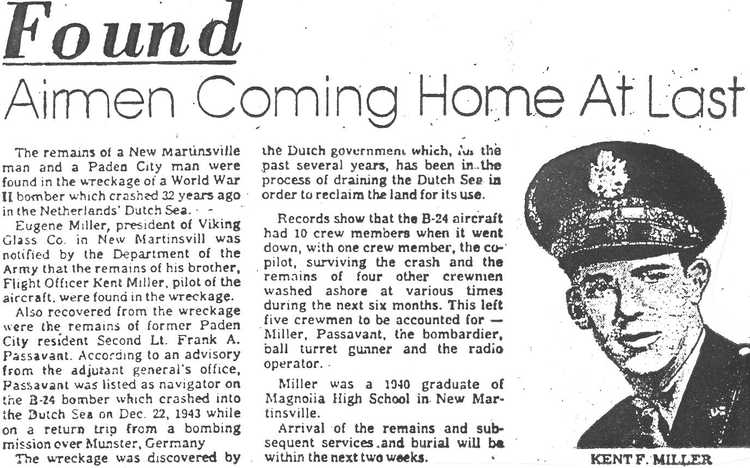Being missing in action is worse than knowing if someone is dead. That’s just the way it is. If you don’t know what has happened to a loved one, it’s feels a lot worse. We often thought we were re- opening old wounds but that clearly wasn’t true. The men found during the salvage, were brought to America to be buried there. Americans still have the choice of whether they want their loved ones to be buried in Europe or in America. I still have a piece of the newspaper ‘Airman finally comes home.’ In the movie ... ‘Some of our airmen are no longer missing’ the brother of the airman talks about how he experienced it when someone knocked on his door to tell him that his brother had been found. These are emotional issues. It was not always easy.
If you can change 'missing in action' to ‘he is buried there' it is a kind of liberation. It is quite common for people, especially in Germany, to visit the grave of an old friend once a year or more to tell them what has been happening over the last year. If you don’t have a grave to visit, you can’ t do this and that makes it even worse.
We found lots of things. Everyday things. A mug for example. The simple fact of finding a pair of shoes with something in it, means you’d found someone. Now you had to find out who among the crew wore those shoes? They all had boots on. The flight engineer. You could figure it out.
I was also responsible for looking to see what part of the plane had been found and with whom. If you found parts of a tail-turret, it couldn’t be the pilot or if you found parts of the cockpit, it couldn’t be the tail gunner. You had to pay attention to all of this. They had coins on them, gold rings, keys to a locker, all these things. However you had no idea what lockers, how many lockers were there?? You found English money of that time but you can’t trace this back to a person.
A piece of paper from a wireless operator. Whilst you were listening, you would draw. That way you had something to do. I did the same myself. He, however, drew himself. It is an Indian. There were a lot of Indians in the U.S. signal service because they spoke their native language among themselves and the enemy wasn’t able to understand them. That’s the way it works.
We found a little angel made of tinfoil in the purse of a airman. He was married a few months earlier and it had been sitting on the wedding cake. That silver-paper angel went to the widow. If you found personal things and you knew who’s it was, it was always given back. We never had personal contact with the people. We only had contact with the Army Grave-services and they they passed it on to the official authorities. I had to sign for the identity of the aircraft, then it went to the embassy and they arranged it further. We never came into direct contact with the family. I did only once talk with families. For example, I went with a woman from England to the spot where the aircraft of her brother had been recovered.
